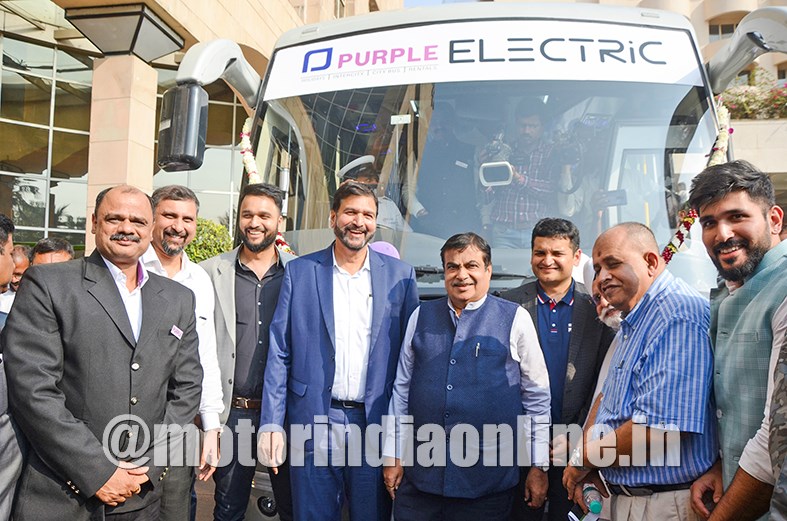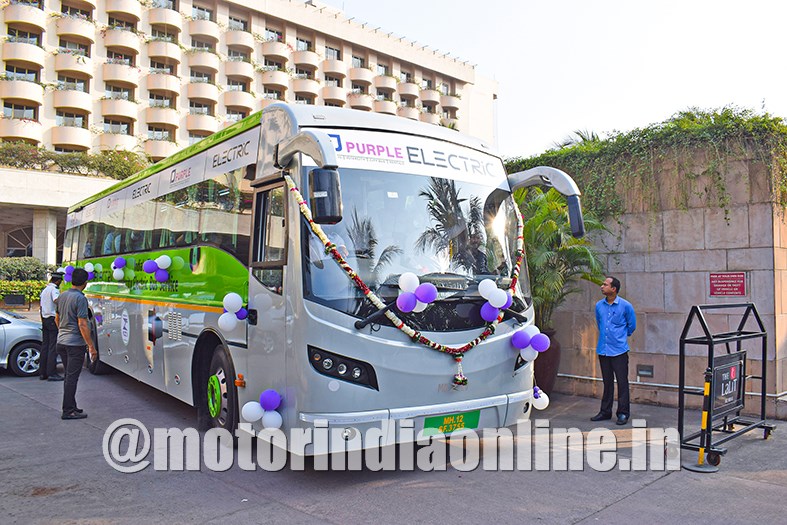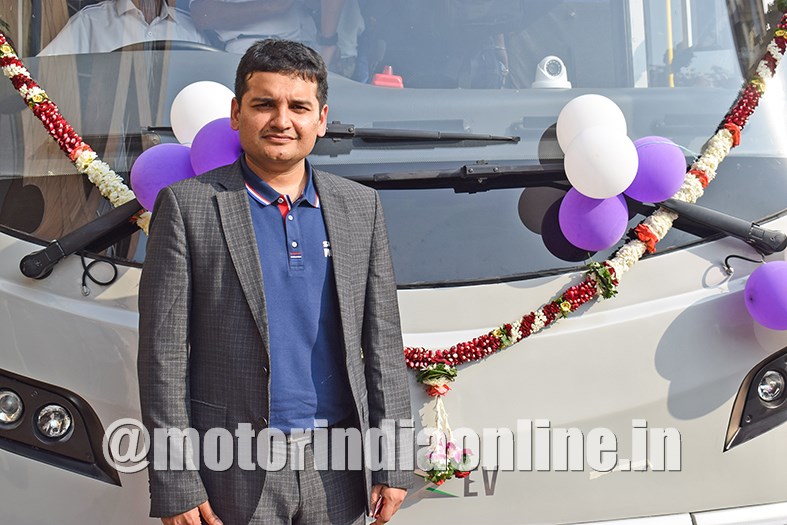Even as the passenger transport industry in India witnesses a major transition towards adapting cleaner sources of mobility, Prasanna Purple Mobility Solutions (P) Ltd., which operates about 1,300 vehicles and is amongst the leading private operators of the country, has taken a leadership position to acquire and start India’s first inter-city electric super-luxury bus service for the Mumbai-Pune-Mumbai route. Rajesh Rajgor reports
Prasanna Purple, a well-known transportation service provider with over 30 years of experience in the field, has introduced the country’s first electric bus on an inter-city route. The electric bus comes from ‘Mozev’, a brand of Mytrah Mobility which a fast-growing bus maker with manufacturing setup in Jaipur. The newly-commissioned pure electric bus is a 12 m, 2×2 luxury coach that will run to and fro between Pune to Mumbai twice a day. Prasanna Purple has reportedly already set up a charging station for the bus at Pune and Mumbai and once fully charged for two hours, the bus can travel up to 300 km at a top speed of 100 km per hour. The bus has a capacity of 43 seats, equipped with latest entertainment facilities, ample luggage space, comfortable push-back seats and in-built USB chargers, thereby ensuring a comfortable journey for those commuting on this route for business and leisure.

The bus was launched in the presence of Nitin Gadkari, Union Minister of Road Transport and Highways, along with Prasanna Patwardhan, Chairman and Managing Director, Prasanna Purple Mobility Solutions, and Ankit Singhvi, Founder and Managing Director, Mytrah Mobility (P) Ltd.
Elaborating about this initiative, Patwardhan said: “We have always been at the forefront of innovation and the use of indigenous technologies. Crafting better travel experiences for our passengers while focusing on safety and punctuality is something we have been continuously striving for. This new move in the EV space will be another opportunity to serve our customers.” Prasanna Purple plans to extend this service to other routes within Maharashtra and adjacent states in due course of time.
The big picture
Prasanna Purple is the first bus operator in India to have opted for inter-city electric buses. This launch has been triggered by the National Electric Mobility Mission Plan (NEMMP) announced by the Government of India which aims to achieve national fuel security by promoting electric vehicles in the country. The Mumbai to Pune road journey of about 150 km has many State and private bus operators, including the Maharashtra State Road Transport Corporation. There are close to 200 buses that use this route per day. And given the fact that this number is on the rise, carbon emission is bound to increase in time. The only solution to curb this menace is to shift towards renewable and clean sources of energy.
As electric buses promise zero tailpipe emissions and a reduction in air pollution, the initiative taken by Prasanna Purple is indeed commendable. In India, the transport sector is the major consumer of diesel, accounting for almost 70% of the total diesel sales, out of which buses account for 9.55%. By 2030, the entire nation is expected to adopt electric vehicles as a future mode of transportation and the electric bus will play a major role in this development. With India’s Rs. 7 lakh crores of fuel imports, pollution is also being imported. “Given such alarming data, we feel it is our responsibility to contribute to Prime Minister Narendra Modi’s vision of reducing the fuel import bill 10% by 2022,” Patwardhan states.
Value proposition
However, shifting to an electric mode of transport raises a fundamental question: is it viable? “Our calculations indicate that if we manage to cross 12,000 km per month on a return trip every day, then it becomes a viable business proposition. Even though this year has not been so good because of overall market slowdown, we continuously strive to give better services to our customers and the introduction of the electric bus is also a part of that plan,” Patwardhan says. Point out to Patwardhan that people are less likely to think about what mode of vehicle they travel in as long as they get comfort, convenience and timely service, how will the company attract its customers to opt for the e-bus?
“An electric bus provides passengers much better comfort than any other vehicle using any other form of fuel because it is soundless with almost zero vibration. Passengers are going to love the peaceful ambience that such a bus will provide,” he replies. Probe him about partnering with Mytrah Mobility as against an established name like BYD or any other popular OEM, Patwardhan states: “We decided to work with Mytrah Mobility and their Mozev platform because they first offered it to us and got us involved from the designing stage. I cannot comment on the performance of any other bus manufacturer since I have not used their services.”
‘Our value proposition is to make EVs profitable’
Exclusive interview with Ankit Singhvi, Founder and Managing Director of Mytrah Mobility.
Excerpts:
How did you commission this project?
The journey started years ago when there was no electric bus in India. The premise for an electric bus is that the more you run it, the better the economics will be. Our plan was to develop an inter-city bus. Further, India being a fragmented market where 85% of the fleet is owned by private operators, we decided to search for the right partner and that is how we zeroed in on Prasanna Purple. They are an institution in the bus operators’ community. We had the right product and hence we had a feeling that they would be positive and open about accepting it.
Our whole value proposition was to understand how we can make EV more profitable. Therefore, this bus has been developed and launched without any government subsidy. Using it for the Mumbai-Pune route will be a demonstration of how the transport industry can switch over to electric vehicles. Prasanna Purple has always had a pioneering spirit and they liked the packaging we offered and thus came on board.
Do you feel you will have to do a lot of benchmarking with competition in the segment from Olectra and other home-grown players?
We did a trial in partnership with BYD on the Himachal Rohtang Pass couple of years ago. Our value proposition was to understand how we can make EV profitable. It was this understanding that has finally led to the inter-city e-bus. What is more important is that we set up the charging infrastructure and have worked on it with a full stack approach. We also work with banks to help financing and manage the end-of-life maintenance. At the end of the day it is about making it profitable for our customers. To answer your question, we have already set very high benchmarks.
The way we manufacture vehicles, and especially buses, is more of system integration. Our bus is no less than a global product. We have sourced the traction system from a Canadian company, steering from Bosch, braking systems from WABCO, rims from Alcoa and tyres from Michelin. Of course, the battery management system (BMS) is imported but this is the start and as the market matures localisation will be the way forward. We have developed in-house technology and the charging infrastructure will be shared across operators – that’s how we plan to drive utilisation. To make EVs profitable without government intervention is our aim and we want to keep improving it.
Could you share some salient features about the bus and also about other projects in the pipeline?
This inter-city electric bus is a 12-metre-long bus, comparable to a premium luxury bus with electronically controlled air-suspension with a monocoque chassis. The bus can travel around 300 km with air-conditioning and full load. In an hour of charging we can add a range of 250 km and therefore this is perfect for inter-city application with most routes being of 250-300 km. It has very low NVH compared to diesel buses, comfortable seating and all the other services that you would expect from a luxury bus, including the safety feature.
We are confident that once people experience this, the benchmark for customer experience will go up. As far as orders are concerned, we have an order of 170 buses of which 125 are 12 metres and 50 are DMRC feeder buses. In the inter-city segment we have 100% market share and again we are the only company running three different types of buses – for example, the one at Delhi Airport is a low-floor bus with a different technology developed with our technology partner Skywell.
For inter-city e-buses we need large batteries with fast charging and so we have to adapt the technology as per the application. We use a lot of technology for network sharing. For example, for optimisation we get direct data on our systems so that we can do predictive maintenance. All this calls for huge investments and therefore we have to make sure that the product is profitable for our customers. We are now looking forward to even working with state transport units because they too are working on a business model of cost per km.
What are the orders from Prasanna Purple? Also, could you provide more details about your company and its manufacturing strength?
Prasanna Purple has placed an order of six buses as of now – two of which are ready and the rest will be ready during the year. Ours is a three-year-old company. I am a first-generation entrepreneur and graduated from IIT. I worked with McKinsey after completing my MBA from Harvard University before starting the company. The initial funds were sourced from the Mytrah family which is a reliable energy IIP. Till date we have not raised any other institutional capital. But we will soon do so since we are now in a position to approach the market and raise capital. We are based out of Gurgaon and manufacturing is at Jaipur. We make around 30-40 buses per month.

